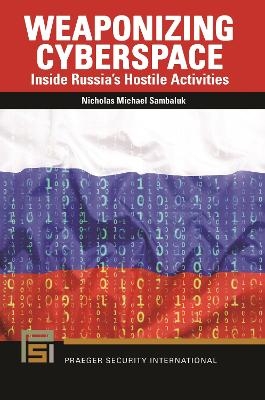
Weaponizing Cyberspace
Inside Russia's Hostile Activities
Seiten
2022
Praeger Publishers Inc (Verlag)
978-1-4408-7691-2 (ISBN)
Praeger Publishers Inc (Verlag)
978-1-4408-7691-2 (ISBN)
The Russian regime's struggle for internal control drives multifaceted actions in cyberspace that do not stop at national borders. Cybercrime, technical hacking, and disinformation are complementary tools to preserve national power internally while projecting effects onto myriad neighbors and rivals.
Russian activity in the cyber domain is infamous in the United States and other Western countries. Weaponizing Cyberspace explores the Russian proclivity, particularly in the 21st century, for using cyberspace as an environment in which to launch technical attacks and disinformation campaigns that sow chaos and distraction in ways that provide short-term advantage to autocrats in the Kremlin.
Arguing that Russia's goal is to divide people, Sambaluk explains that Russia's modus operandi in disinformation campaigning is specifically to find and exploit existing sore spots in other countries. In the U.S., this often means inflaming political tensions among people on the far left and far right. Russia's actions have taken different forms, including the sophisticated surveillance and sabotage of critical infrastructure, the ransoming of data by criminal groups, and a welter of often mutually contradictory disinformation messages that pollute online discourse within and beyond Russia. Whether deployed to contribute to hybrid war or to psychological fracture and disillusionment in targeted societies, the threat is real and must be understood and effectively addressed.
Russian activity in the cyber domain is infamous in the United States and other Western countries. Weaponizing Cyberspace explores the Russian proclivity, particularly in the 21st century, for using cyberspace as an environment in which to launch technical attacks and disinformation campaigns that sow chaos and distraction in ways that provide short-term advantage to autocrats in the Kremlin.
Arguing that Russia's goal is to divide people, Sambaluk explains that Russia's modus operandi in disinformation campaigning is specifically to find and exploit existing sore spots in other countries. In the U.S., this often means inflaming political tensions among people on the far left and far right. Russia's actions have taken different forms, including the sophisticated surveillance and sabotage of critical infrastructure, the ransoming of data by criminal groups, and a welter of often mutually contradictory disinformation messages that pollute online discourse within and beyond Russia. Whether deployed to contribute to hybrid war or to psychological fracture and disillusionment in targeted societies, the threat is real and must be understood and effectively addressed.
Nicholas Michael Sambaluk, PhD, is associate professor at the Air Force Cyber College at Maxwell Air Force Base, AL.
Preface
Acknowledgments
1. The Cyber Bear
2. Modern Russia, Regime Sensitivity, and Its Implications
3. Domestic Control
4. Crime, Attribution, and Persistence
5. The Near Abroad
6. Foreign Hand, Distant Land
7. Crescendo into Chaos
8. Maple Street, USA
9. Kafka's Paradise
10. Conclusions
Notes
Bibliography
Index
| Erscheinungsdatum | 06.03.2022 |
|---|---|
| Reihe/Serie | Praeger Security International |
| Sprache | englisch |
| Maße | 156 x 235 mm |
| Gewicht | 567 g |
| Themenwelt | Natur / Technik ► Fahrzeuge / Flugzeuge / Schiffe ► Militärfahrzeuge / -flugzeuge / -schiffe |
| Informatik ► Netzwerke ► Sicherheit / Firewall | |
| Sozialwissenschaften ► Politik / Verwaltung ► Europäische / Internationale Politik | |
| ISBN-10 | 1-4408-7691-6 / 1440876916 |
| ISBN-13 | 978-1-4408-7691-2 / 9781440876912 |
| Zustand | Neuware |
| Haben Sie eine Frage zum Produkt? |
Mehr entdecken
aus dem Bereich
aus dem Bereich
von der Machtergreifung bis zur Gründung der Vereinten Nationen
Buch | Softcover (2023)
Motorbuch Verlag
CHF 38,90


